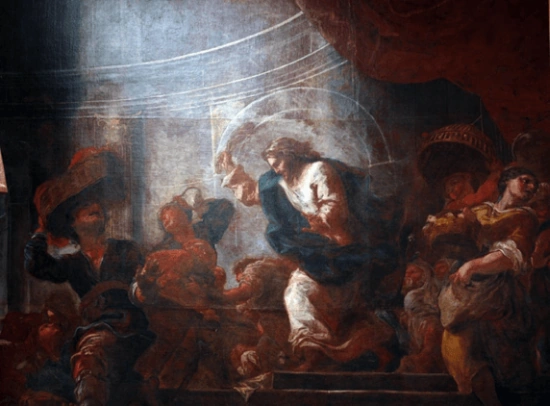
We hear a lot about anger management these days. We know that anger is supposed to be a bad thing, a negative emotion. And yet, we sometimes feel angry for what seem to us to be good reasons, even after we calm down. Not only that, but in the Bible, in the Old Testament, Jehovah is often pictured as being angry. Even in the New Testament, Jesus seems to be angry sometimes, like when he cleanses the temple. So, what does the Bible teach us about anger? What is the inner meaning of these descriptions of anger and wrath?
In Genesis 31:36, we read that 'Jacob was incensed and wrangled with Laban', after Laban had given him Leah, instead of Rachel, as a wife.
In Arcana Coelestia 4164, we read that this "means the zeal of the natural. This is clear from the meaning of 'being incensed' or being angry, and as a result 'wrangling', as zeal; and from the representation of 'Jacob' as the good of the natural, dealt with already. The reason why 'being incensed', or being angry, and as a result 'wrangling', means zeal is that in heaven or among angels no anger exists, but instead of anger zeal. For anger is different from zeal, in that anger contains evil but zeal contains good. Or to put it another way, a person who is filled with anger intends evil to another with whom he is angry, whereas someone who is filled with zeal intends good to another for whom he is zealous. For this reason also a person who is filled with zeal is able to be good in an instant, and in what he is actually doing to be good towards others. Not so with a person who is filled with anger. Although in outward form zeal has a similar appearance to anger, in inward form it is altogether dissimilar."Another good reference from Swedenborg's works is here, in Conjugial Love 358, an excerpt from which follows:
"Viewed in itself, zeal is, so to speak, the fire of love set ablaze. One cannot know what jealousness is unless one knows what zeal is; for jealousness is the zeal of conjugial love. Zeal is, so to speak, the fire of love set ablaze, because zeal is an expression of love, and love is spiritual warmth, which in its origin is a kind of fire.
As regards the first point, that zeal is an expression of love - this people know. When they speak of being zealous and acting from zeal they mean nothing else than an intensity of love. But because it does not appear as love when it manifests itself, but as antagonistic and hostile - being militant and combative against one who does injury to the love, therefore it may also be called the defender and protector of love."







